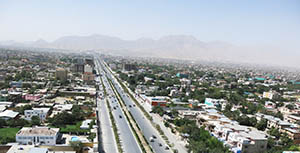Background

Never before in its history has Afghanistan had such an enormous opportunity to lay strong foundations for a sustainable and prosperous urban future. A combination of forces are currently in place that, if urgently harnessed, can set Afghanistan on a path to harnessing its cities, and their rural-urban linkages, for economic development, improved sub-national governance and stabilization.
This convergence of positive forces includes:
• The formation of the new National Unity Government (NUG), where urbanization is recognized as a phenomena that can drive economic growth and stabilization;
• The President and NUG's commitment to making one of the ten new NPPs an U-NPP;
• The major refocusing of national government activities, both rural (e.g. NSP4, which is slated to have a greater focus on cluster CDCs and economic development) and urban programming (e.g. an Urban Solidarity/Upgrading Programme);
• The political ambition to develop a National Urban Policy and Spatial Strategy, and create 'Metropolitan Regions' around the major cities;
The Realizing Self Reliance paper presented at the London Conference on Afghanistan (2014) clearly articulates the reform priority for urban development;
"Making cities the economic drivers for development. In order to do so we need to improve living conditions and service delivery in urban centers. Urbanization will need to be managed by reducing disparity between rural and urban areas and thereby controlling rural-to-urban migration. ... Establishing metropolitan development authorities and funds will allow for coordinated development planning and professionalized management."(Realising Self-Reliance (2014) National Unity Government of Afghanistan, p.12)
Objectives
The Programme provide capacity development support and technical assistance to government partners to support the development of the Urban National Priority Programme (U-NPP) in a participatory way involving relevant government ministries and departments, municipalities, civil society and the private sector. The programme also examines five city regions and 20 district municipalities in terms of population, land use, housing and rural-urban linkages.
The Specific Objective is: "Strengthened government capacity and coordination and data in line with a new national framework for urban development ('U-NPP')".
Expected Outcome
1: Improved national policy environment: an U-NPP is drafted in a participatory manner
2: Improved knowledge and data on city regions and strategic district municipalities to support the development of an U-NPP and associated programming during the 'transformation decade'
Activities
1.1 Strengthen capacity of MUDA, IDLG/GDMA, ARAZI and Kabul Municipality for Urban NPP formulation
1.2 Improve stakeholder coordination and civil-society engagement for U-NPP development
1.3 Increase technical knowledge, information and awareness on the U-NPP, city regions, strategic district municipalities, and sustainable urbanisation in Afghanistan
2.1 Improved data on five city regions (land use, dwellings, infrastructure, environment)
2.2 Improved data on 20 strategic district municipalities (land use and dwelling/population)
2.3 Improved availability and accessibility of up-to-date data on city regions and strategic district municipalities (Afghan City Regions Atlas 2016 (English, Dari and Pashto)
Development Partners/Partners
Development Partners: Government of Australia and Department for International Development (DFID) of United Kingdom
Government Partners: Ministry of Urban Development Affairs (MUDA), Independent Directorate for Local Governance (IDLG), Kabul Municipality, Afghanistan Land Authority (ARAZI)
Related Publication
The Future of Afghan Cities discussion paper series brings attention to urban priority areas in Afghanistan. Each of the 10 papers in the series invites the reader to look at urban matters through different lenses, both by introducing pioneering population and land-use data and through new concepts and innovative ideas. The topics have been selected to spur interest and facilitate the conversation around the Urban National Priority Programme (U-NPP).
* Dicussion Paper #1: Breaking the Rural - Urban Divide
* Discussion Paper #2: Beyond Provincial Capital Cities
* Discussion Paper #3: National Support for Afghan Cities
* Discussion Paper #4: Harnessing City Economies
* Discussion Paper #5: Youth Participation as a Catalyst for Stability
* Discussion Paper #6: On The Move in Kabul City Region
* Discussion Paper #7: A Portrait of the Capital
* Discussion Paper #8: Citizens Charter in Cities
*Discussion Paper #9: Rural Urban Continuum for Productive Cities
*Discussion Paper #10: Opportunities with Options
- Overview
- Community Development Project: National Solidarity Programme (NSP)
- Afghanistan Urban Peacebuilding Programme (AUPP)
- Future of Afghan Cities Programme (FoAC)
- Kabul Solidarity Programme Phase 2
- Community-Based Municipal Support Programme
- Kabul Solidarity Programme
- Developing Irrigation Associations for On-Farm Water Management Project
- Behaviour Change Communication
- Assessment of Options for Community Benefit Sharing for CASA-1000
- Urban Solidarity Programme
- Reintegration of Returnees and IDPs through Policy, Planning and Targeted Assistance (EU8)
- Strengthening Municipal and Community Development in Lashkar Gah – Phase III
- Peace-Building in Afghanistan through Consolidation of Community Solidarity (PACCS)
- Reintegration of Returnees and Internally Displaced Persons (IDPs) through Policy, Planning and Targeted Assistance (EC7)
- Strengthening Municipal and Community Governance in Lashkar Gah - Phase II
- Community Empowerment and Development for Peace Building
- Learning for Community Empowerment Programme (LCEP Phase 2)
- Reintegration of Returnees and IDPs through Policy, Planning and Targeted Assistance (EC6)
- Behaviour Change and Communication
- Governance and Development Support Programme in Kandahar (GDSP)
- NSP - Spinboldak and Khakrez in District of Kandahar
- Upgrading Informal Settlements in Kandahar City
- Youth Empowerment Project (YEP)
- Inter-Communal Rural Development Project (IRDP)






































